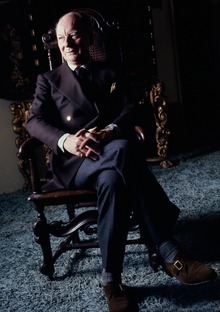I’ve been spending the past couple of weeks reading, thinking, and writing about John Gielgud, who may well have been the greatest classical actor of the twentieth century. If you know anything about theatrical history, you probably know that. What you almost certainly don’t know is that Gielgud was an anti-Semite. You should know it, though, because his letters, which were collected and published in 2005, leave no doubt of it. When I recently reread them, I ran across something like a dozen remarks that were clearly indicative of Gielgud’s feelings about Jews.
 One of them was written after he saw a 1965 Metropolitan Opera production of Aida that starred Richard Tucker, whom Gielgud referred to as “Radames in a tea-cosy gold helmet on top of a fat Jewish face. He is a cantor at one of the synagogues and looks like it. 35 dollars a ticket and a hideous audience for some Israelite Benefit.”
One of them was written after he saw a 1965 Metropolitan Opera production of Aida that starred Richard Tucker, whom Gielgud referred to as “Radames in a tea-cosy gold helmet on top of a fat Jewish face. He is a cantor at one of the synagogues and looks like it. 35 dollars a ticket and a hideous audience for some Israelite Benefit.”
That’s nasty enough, but what he wrote about War and Remembrance, a 1988 TV adaptation of Herman Wouk’s historical novel about World War II in which Gielgud played a Jewish character who died in the gas chambers, is…well, I’ll let you decide: “This endless appetite to go on plugging the Nazi horrors–wildly pro-Jewish American, of course.”
It is, I think, revealing that none of the reviews of Sir John Gielgud: A Life in Letters, so far as I know, made mention of these passages, or others like them. Presumably the reviewers thought them unimportant. Gielgud, after all, never said anything invidious about Jews for public consumption. His anti-Semitism appears to have been a purely private matter, one of which we would know nothing had the editor of his letters chosen to omit it from the book.
Being a biographer who has grappled with closely similar problems, I can’t say I wish that Richard Mangan had sanitized Sir John Gielgud: A Life in Letters. I believe deeply in telling the truth about great men, even when it isn’t pretty. Here is the epigraph to my forthcoming biography of Duke Ellington: “There is one very good thing to be said of posterity, and this is that it turns a blind eye on the defects of greatness.” Somerset Maugham said that, and I think he was right–up to a point.
On the other hand, I don’t believe in pretending that such defects don’t exist, or that they don’t matter. John Gielgud’s anti-Semitism casts no shadow on the quality of his art, but it most definitely casts a shadow on the quality of his soul, and I don’t think it makes me a prig to care about such things.
It is, of course, futile to do so. Artists are strange creatures, flawed and weak and inconsistent, and only a fool takes them for anything else. As I wrote in this space nine years ago:
But, then, artists also incline to ruthlessness, don’t they? As William Faulkner once observed, “If a writer has to rob his mother, he will not hesitate: The ‘Ode on a Grecian Urn’ is worth any number of old ladies.” This is not, thank God, a universal rule. Most of my friends are artists, and most of them seem disinclined to rob their mothers. But most of the great artists I’ve known–and it’s a short list–have done things in the service of their art at one time or another (though never to me) that were so selfish as to make my hair stand up.
Plenty of great artists have said and done things that make us shudder today, and wise critics endeavor to separate their bad behavior from the beautiful objects of art that they created. To do otherwise is to run the risk of falling victim to retrospective self-righteousness. I’ll always love John Gielgud’s artistry, and I doubt I’ll be thinking of the fact that he didn’t like Jews the next time I watch Ages of Man or Arthur. But I have no intention of forgetting it, any more than I would ever allow myself to forget that George Bernard Shaw was a Stalinist or Alfred Cortot a Nazi collaborator.
The ability to make great art excuses no man his basic human responsibilities. That is a debt he owes to us all.
